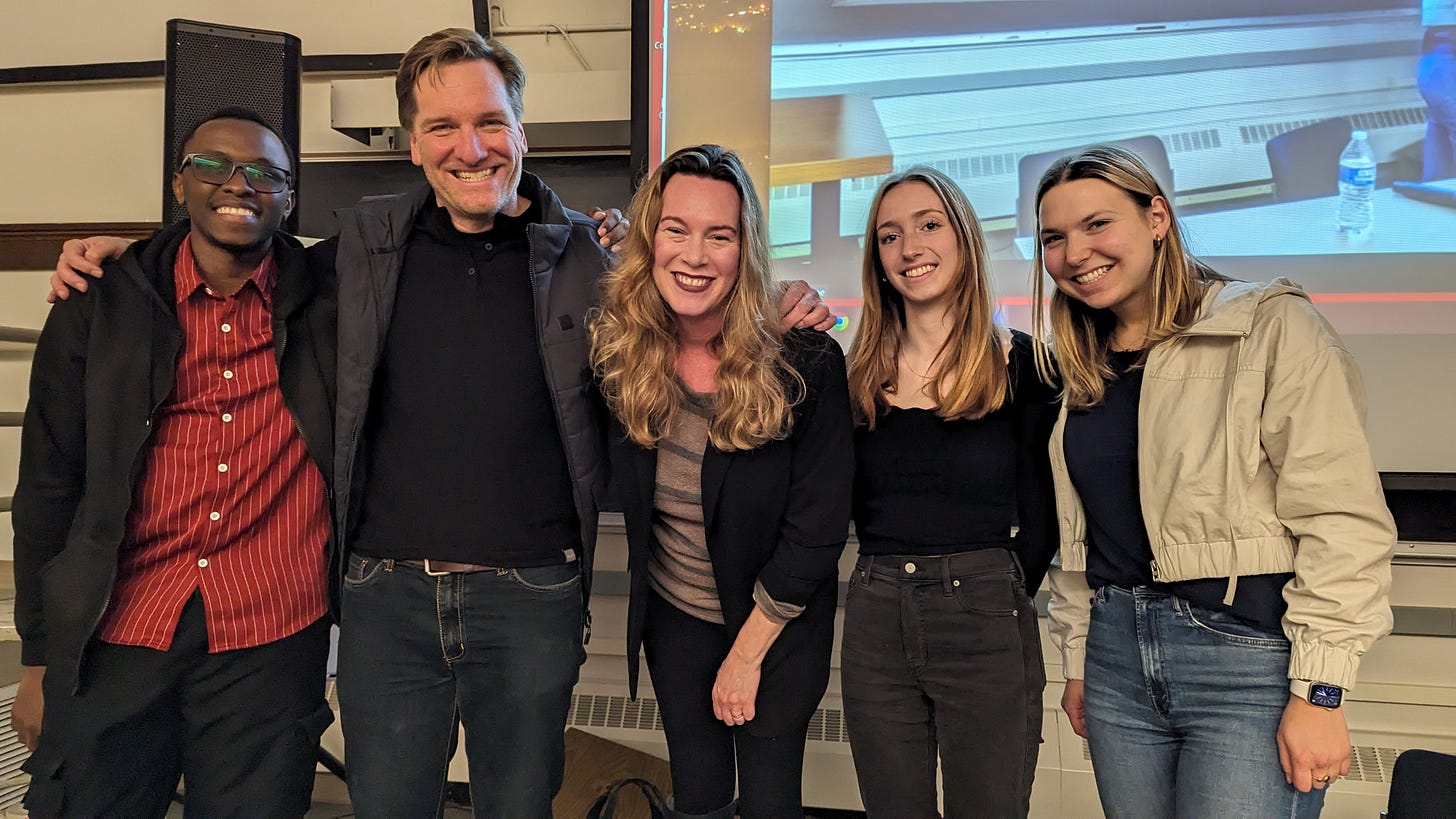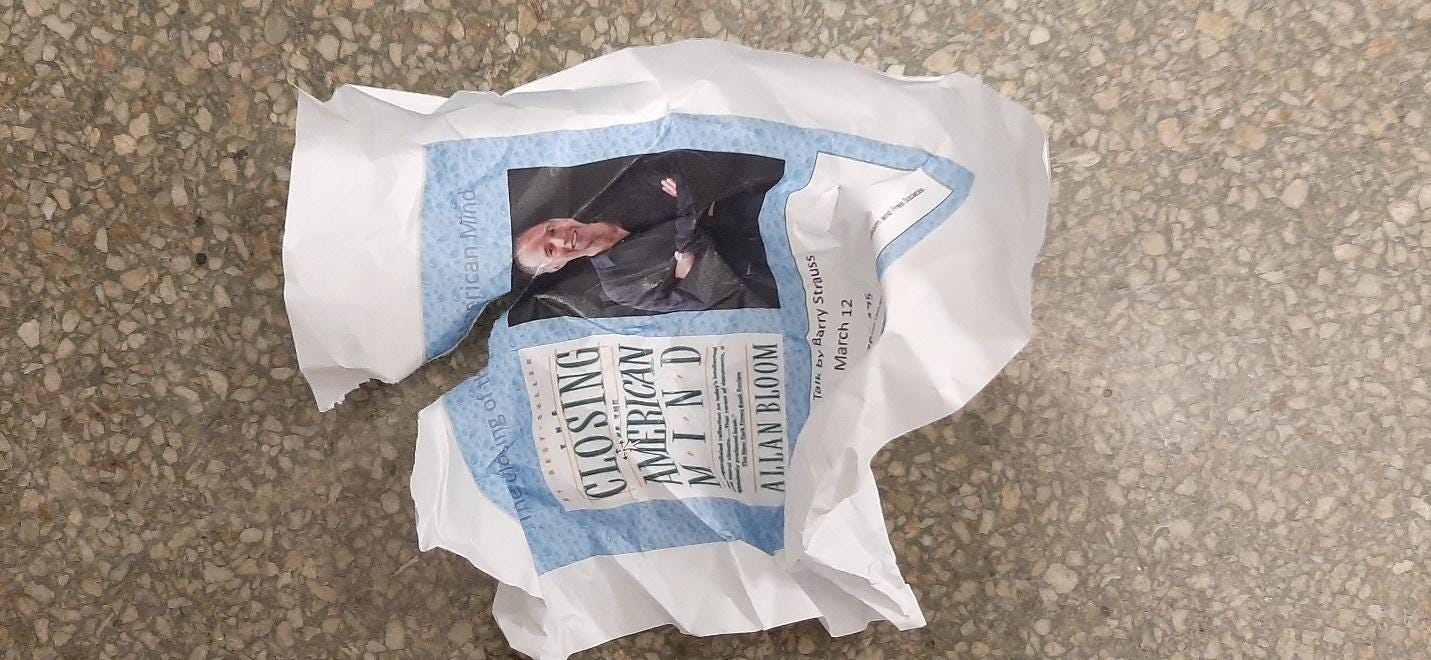Another Ivy League President is Gone: Why I Have Been Expecting Cornell's Martha Pollack to "Retire"
An insider's perspective
Dear Subscribers,
On Friday, I was surprised to read that Cornell University President Martha Pollack had resigned. I once regarded her as something rare among Ivy League presidents—a defender of free speech and open inquiry. But then I met Randy Wayne.
The Cornell biologist and co-chair of Heterodox Academy at Cornell explained the depressing reality behind his university’s much-touted “Year of Free Expression.” He also hosted us during our recent trip to Ithaca, where our Coddling movie screening was subject to some of the same intolerance Randy and his colleagues have been chronicling for years.

So when I heard about Pollack’s resignation, I thought of Randy right away. I asked him to shed some light on Pollack’s resignation, and was thrilled when he said he would.
What follows is Randy’s insider perspective on what is going on at Cornell.
All the best,
Ted
On May 9, 2024, at 1:24 PM Cornellians received an email from President Martha Pollack stating that she will be retiring on June 30.
President Pollack wrote:
I understand that there will be lots of speculation about my decision, so let me be as clear as I can: This decision is mine and mine alone. After seven fruitful and gratifying years as Cornell’s president — and after a career in research and academia spanning five decades — I’m ready for a new chapter in my life.
It is my opinion that President Pollack’s resignation was the necessary and logical conclusion for Cornell to maintain its brand and its funding, both public and private. Publicly, federal funding, as well as taxation on endowments, is at risk and continues to be at risk. Privately, alumni donations were at risk.
If President Pollack were to stay, I believe the school was bound to have an economic hit and in the worst case scenario, an economic disaster. All of it because of President Pollack’s policy of choosing who could and who could not speak freely at Cornell (something that seems to be contrary to federal anti-discrimination policy) and her record of putting DEI above both free speech and merit.
President Pollack wrote about the timing of her retirement in the email:
It is only after extensive reflection that I have determined that this is the right decision. Indeed, I began deliberating about this last fall, and made the decision over the December break; but three times, as I was ready to act on it, I had to pause because of events on our and/or on other campuses.
President Pollack wrote that she had been deliberating about retirement since last fall, but common sense argues that she had not committed to a decision as late as January 27, when the Board of Trustees unanimously voted to support her. Indeed, one has to ask, if President Pollack really decided to resign before January 27, why would she let the Board even vote to unanimously support her?
The unanimous vote of support from the Trustees on January 27 came on the heels of an open letter that Cornell alumnus, donor, and former trustee, Jon A. Lindseth sent to the Chairman Kraig Kayser and the Cornell Board of Trustees on January 22. Lindseth wrote:
President Pollack’s shameful recent response to clear acts of terrorism and antisemitism compared with her swift and strong response to the George Floyd tragedy demonstrates that Cornell is no longer concerned with discovering and disseminating knowledge, but rather with adhering to DEI groupthink policies and racialization…
Today the instruction Cornell offers is in DEI groupthink applied to every field of study. The result is a moral decay, some call it “rot”, that falls in line with prevailing ideology and dishonors basic principles of justice and free speech. Under President Pollack's leadership the university continues to put more value on DEI’s broad application rather than merit. This was not how Cornell became one of the country’s leading institutions and a proud member of the Ivy League.
The Wall Street Journal reported on January 24, that wealthy donors in the Cornell Free Speech Alliance and yours truly, an underpaid associate professor, also called for President Pollack’s resignation. However, with all the money Cornell University receives from authoritarian countries such as Qatar, Saudi Arabia, and China, I believed that the withholding of alumni donations was not enough for President Pollack to resign.
However, my opinion changed on January 25 when I read The Cornell Daily Sun. After reading the news, I expected that President Pollack would have to “decide to retire.”
On January 25, The Cornell Daily Sun published a story entitled, “Ways and Means Committee Chairman Challenges Cornell’s Tax-Exempt Status Over Response to Hamas Attacks, Treatment of Jewish Students,” that included a link to a letter that Congressman Jason Smith, as chairman of the House Ways and Means Committee, wrote on January 10 to four university presidents or acting presidents reminding them that their universitys’ tax exempt status and their federal funding was contingent on their compliance with federal antidiscrimination laws.
The letter was sent to President Pollack as a response to Talia Dror’s compelling testimony to the House Ways and Means Committee where she stated that Cornell failed to uphold their self-proclaimed values of equity and belonging when students, professors, and administrators celebrated the brutal massacre of innocent civilians that took place on October 7, 2024.
It did not escape Chairman Smith’s notice that the institutions he called out regarding their inaction when it came to Jew hatred on campus had no problem condemning the failure to use preferred pronouns or making true comments that did not fit the universities narrative regarding George Floyd.
Chairman Smith went on to write,
Free speech should be protected – even speech we disdain. But your universities have long practiced the protection of preferred speech rather than truly protecting all speech. In so doing, you appear to have lost the ability to recognize when speech crosses the line into conduct, especially on topics that do not fit into your preferred categories.
Chairman Smith requested responses to the following by January 24, 2024:
1. Please provide and clearly identify your policies relating to student free speech rights, associational rights, and any relevant student codes of conduct.
2. What is your university doing, if anything, to address the poor ratings you have received from FIRE on protecting free speech on campus?
3. What is your university doing, if anything, to examine how it evaluates the difference between free speech and harassment, threats, and incitement?
4. Do you have policies in place to determine when you, as a university president, will issue a statement in response to events either on your campus or elsewhere? If so, please provide a copy of those policies.
5. How do you decide whether to issue a statement on a particular event?
6. As a tax-exempt entity, how are you fulfilling your educational purpose for your Jewish students on campus?
7. Is your university subject to the excise tax based on investment income of private colleges and universities under Internal Revenue Code (IRC) § 4968?
a. If yes, please provide the market value of your university’s endowment for the most recent fiscal year.
b. If yes, please provide the amount your university paid under IRC § 4968 for the most recent tax year.
8. How does your university’s endowment contribute or further your university’s tax-exempt purpose?
9. How are you adequately protecting your Jewish students on campus to comply with antidiscrimination laws and your university’s tax-exempt status?
10. How much does your university spend on diversity, equity, and inclusion programming and initiatives?
11. How many staff and university personnel do you have dedicated to diversity, equity, and inclusion programming and initiatives?
12. Please provide any mission statements, policies, handbooks, or other documents that detail the role of diversity, equity, and inclusion departments and programs on your campuses.
13. Do your diversity, equity, and inclusion departments serve Jewish students on campus?
I had written many times to President Pollack to question her commitment to Critical Race Theory training and never got a response. It was clear to me that President Pollack had no ability to defend the indefensible and would never be able to respond coherently to Chairman Smith’s request.
On March 23, The Cornell Daily Sun published another story entitled, “House Ways and Means Committee Cites CML Members’ Praising of Militants in Second Letter to President Pollack,” that included a link to a second letter that Chairman Smith wrote on March 21. The letter, which was only sent to President Pollack, requested additional information.
In the letter, Chairman Smith reiterated:
The focus of the Committee’s inquiry and questions is to understand what universities like yours are doing, if anything, to change course drastically and address what has gone unaddressed for years. Doing so is essential to justifying the generous tax-exempt status that the American people have provided institutions like yours for decades… The moment calls for serious institutional change. That is what this Committee expects and that is what the American people expect from institutions that were designed to prepare and educate the next generation of leaders.
According to The Cornell Daily Sun, the university did respond to Smith’s January letter. However, a university spokesperson declined to comment about that response or the university’s planned response to Smith’s second letter.
I believe that President Pollack is incapable of recognizing the difference between free speech that serves the educational mission of the university and disruptive conduct that is anathema to the educational mission of the university.
Indeed, The American Council of Trustees and Alumni (ACTA) which awarded President Pollack the Hero of Intellectual Freedom Award in 2017 for her commitment to free expression, produced a video in 2022 entitled Cornell University Free Your Campus which specifically called out Cornell University as an institution that failed to protect free expression and intellectual diversity.
In 2023, under President Pollack’s leadership, Cornell dropped from 154th to 212th place out of 248 schools in the free speech rankings of the Foundation for Individual Rights and Expression (FIRE). When the rubber hit the road, President Pollack was unable to be a Hero of Intellectual Freedom.
In his second letter, Chairman Smith made additional requests to President Pollack for answers to the following questions, which he expected no later than 5 p.m. on April 4, 2024.
He wrote:
Please describe what, if any, disciplinary action has been taken against students and other Cornell campus administrators or faculty for violating Cornell’s policies related to antisemitism since October 7, 2023. Please be specific about the discipline rendered and the specific incident at issue related to such discipline. This includes but is not limited to the “die-in” activities in January 2024 that appear to have violated numerous campus policies and the numerous protest activities in February and March 2024 detailed above.
a. Has Cornell punished specific students for violating these policies? If yes, how many?
b. Has Cornell punished the leaders of student groups that organize protests that violate campus policies? If yes, how many?
c. Has Cornell punished student leaders of groups that chant genocidal slogans directed at Jewish students? If yes, how many?
2. Why do you think antisemitism has grown on Cornell’s campus over the last decade?
a. Do you think the rise of antisemitism on Cornell’s campus is a serious problem?
3. As a leader at Cornell, do you believe there are actions that can be taken to help change the campus culture that has allowed antisemitism to flourish on campus? If so, what actions does Cornell plan to take and what tangible impact to you expect those actions to have?
4. Has Cornell (including anyone in Cornell’s administration) ever considered, drafted, or issued a statement on antisemitism between January 1, 2015, to present? If so, please provide details about and copies of those statements, including all drafts of statements considered, and final statements issued by the University or its President during that timeframe.
5. Please provide any drafts and final statements published by the University since 2020 that highlight the difference between protected free speech on campus and unprotected speech that instead amounts to harassment, incitement of violence, etc.
6. Is it true that Cornell receives donations and/or funding from foreign sovereignties or governments? If so, please detail the amount and goal for each donation or piece of funding from 2019 to the present.
I continued to believe that President Pollack was unable to respond coherently to Chairman Smith’s request. This meant that the only serious institutional change Cornell would be capable of achieving would be the “retirement” of President Pollack and the appointment of Provost Michael Kotlikoff as acting president.
Last fall, Provost Kotlikoff showed an interest in free speech by meeting with John Tomasi, president of the Heterodox Academy. This spring, Provost Kotlikoff demonstrated a commitment to free speech by inviting Ann Coulter, Francis Fukuyama, and Nadine Strossen to lecture or participate in discussions on free speech. Let’s hope that Provost Kotlikoff will also demonstrate a commitment to eliminate Cornell’s bloated and deeply embedded Diversity, Equity, and Inclusion bureaucracy, which preempts free speech.
In President Pollack’s resignation letter, she wrote that “We have worked hard to uphold our commitment both to free expression and to being a community of belonging, where everyone is welcome and safe.”
President Pollack may have worked hard, but she failed. This is because President Pollack is oblivious to the fact that free speech, which is necessary for the search for truth and minority rights in a democracy cannot coexist with the so-called “community of belonging” envisioned by the vast Diversity, Equity, and Inclusion (DEI) activist bureaucracy that seeks freedom from speech.
President Pollack’s prioritization of DEI over free speech during the “Cornell’s Theme Year of Freedom of Expression,” where scare quotes were ironically or intentionally the official logo, explains many things.
It explains why Cornell’s First Amendment Clinic boycotted Matt Taibbi’s lecture.
It explains why Cornell’s Director of Counseling and Psychological Services as well as the Professional Academic Advisors boycotted the screening of The Coddling of the American Mind with a talkback with Ted and Courtney Balaker.
It explains why the posters announcing the free speech programming hosted by the Heterodox Academy Campus Community at Cornell University were constantly torn down, having a half-life of approximately three hours.
Since President Pollack is incapable of making the changes that Cornell requires to 1) understand and correct the direction Cornell is heading; 2) undo changes that she had made that devalued the pursuit of truth, abridged civil liberties—especially for Jewish students, and mocked merit; and, 3) provide credible actions that would be real answers to Congress' questions; she had to “retire”.
Because President Pollack’s policy of choosing who could and who could not speak freely at Cornell University was contrary to federal anti-discrimination policy, she put Cornell’s federal funding and tax-exempt status at risk.
It is my opinion that President Pollack resigned so that Cornell would not lose its federal funding, 501(c)(3) tax-exempt status, and private donations. Let’s hope that as acting president, Michael Kotlikoff will make the necessary changes to undo the damage that President Pollack’s illiberal policies inflicted on the first Ivy League University founded in the United States of America.








Wow!
Thank you so much for this insider perspective
2 points:
1) I am exhausted from not using the words we need to use in the media: resigned because otherwise fired, not just resigned. So tired of the way we re-write facts.
2) I also find it fascinating that often those who sit on the boards of a lot of the Ivy League schools are from a different background than where the funding / endowment is coming from— Qatar, Saudi Arabia, and China, etc.
Reflected in the policies and groups, doesn’t it?
I feel sad for the students who are not coming from wealthy & elite backgrounds who are there to get an education, whatever that means now.
There will always be exceptions, but in my lifelong experience as a woman, women generally are not equipped for Free Speech, which requires setting emotions aside. Take Larry Summers' undoing at Harvard for presenting data on women in math. Many walked out upset and rent their garments to get him taken down. Google and James Damore. Women weeping that they didn't feel safe because Damore cited data that perhaps women don't gravitate to coding as much as men do. Women have generally played the role of civilizers on the moral front. Their rising dominance in universities correlates to this stymying phenomenon. We should replace desks with fainting couches. Oh how ironic, too, that the Women's Studies lot insist that there is no difference between men and women, it's all a "social construct," while simultaneously heaving with emotion over hearing information that they don't like.